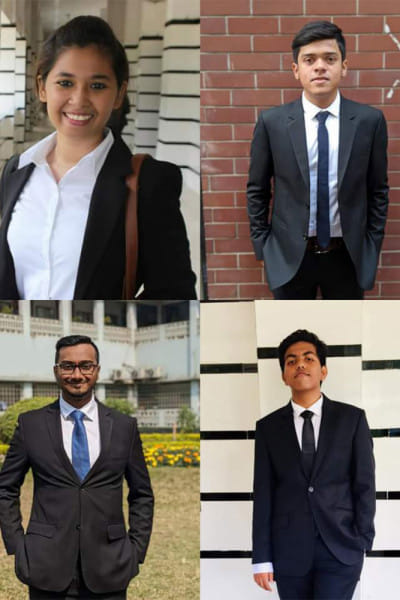Dhaka University at the 14th Price Media Law Moot Court Competition: Reflections and Outcomes

Inaugurated in 2008, the Price Media Law Moot Court Programme was established by the Programme in Comparative Media Law & Policy (PCMPLP), at the University of Oxford. The Moot Competition has been a part of the Bonavero Institute of Human Rights in the Faculty of Law at the University of Oxford, since August 2017. Named after the founding director of the programme, Monroe E. Price, this is the largest mooting competition in the field of international media law.
30 out of 100 qualifying teams to the Global Rounds have represented their countries from their respective regions in the 14th edition of this Moot. Alongside teams from Singapore, Malaysia, China, Egypt, Palestine, Nigeria, Philippines, Greece, Hungary, UK, USA, Luxembourg, Ireland, Germany, India and others, Bangladesh has also been represented by a team from the University of Dhaka (DU) who qualified from the South Asia Regional Rounds. The team comprised of Tanveer Ahmed Fahim, Biva Mosharraf, Maruf Hasan Tamal and Rafi Ibn Masud, students from the Department of Law, DU. Dr. Mohammad Nazmuzzaman Bhuiyan, Professor, Department of Law, DU coached the team for this Competition.
Due to the COVID-19 pandemic, this year's Competition was held online entirely. Despite the unusual and unpredictable circumstances, the team was able to successfully qualify for the South Asian Regional Rounds and then advance into the Global Rounds, competing against top teams from around the world. Although the team could not proceed to the Semi Finals, their memorials (written submissions) and oral submissions were highly praised by the international judges of the Competition while also bagging a victory in the Global Rounds. This year, the Jonathan Blake Spirit of the Moot Award was awarded to all the COACHES of the teams—working hard behind the scenes to encourage, assist and applaud the teams' best efforts.
This year's competition case contained various aspects of media law: freedom of expression, freedom of assembly, freedom of movement, prior restraint of speech and a novel virus outbreak. Due to the great extent of similarity between the facts of the case and notable instances during the COVID-19 pandemic, numerous connections could be found between the fictitious Moot problem and the ongoing crisis.
Despite varying in facts and events, researching for the memorials and appearing before international judges has allowed the team to have a deeper understanding of the governance of human rights during an epidemic and the impact of peoples' distrust in the State mechanism during such periods of crisis. The key takeaway for the team was a deeper understanding of the margin of appreciation and how a Government in discharge of its responsibilities [in maintaining law and order] is essentially a delicate problem of appreciating complex factors and of balancing conflicting considerations of the public interest.
The aim of the moot is explained brilliantly by the words of the organisers of the Middle East Regional Rounds, Ahmed F. Khalifa and Ola Nagy, "The Moot engenders in the participants, the great lesson of realising that life is a question of perspective where you can see everything from different angles and always carry part of the truth, while others from different perspectives may also carry another part of it."
Event Report by Tanveer Ahmed Fahim, student of law at University of Dhaka.

 For all latest news, follow The Daily Star's Google News channel.
For all latest news, follow The Daily Star's Google News channel. 



Comments